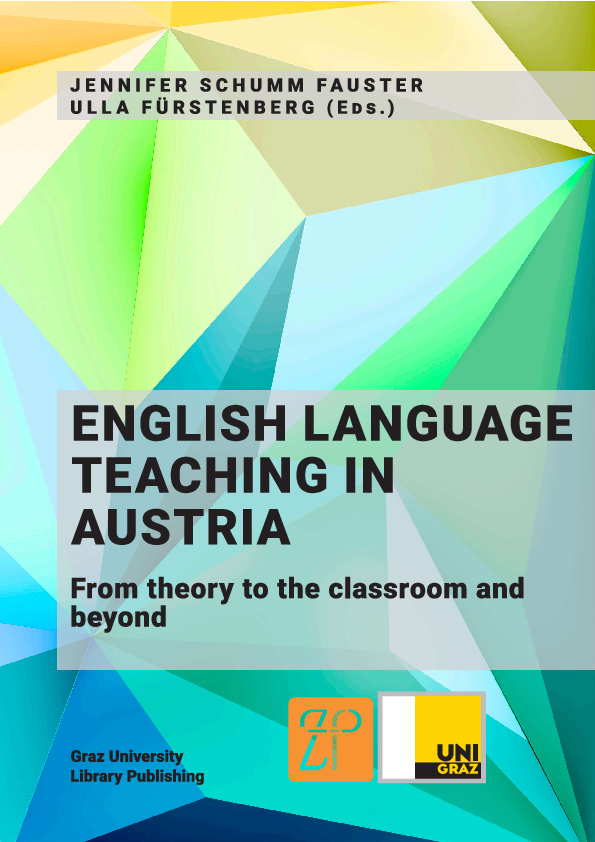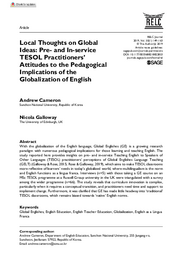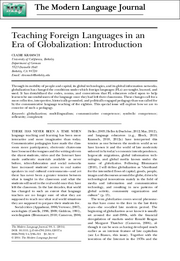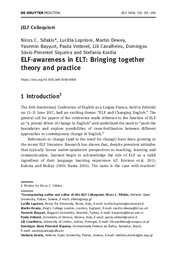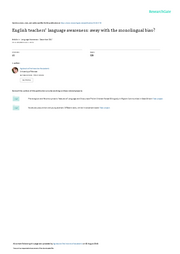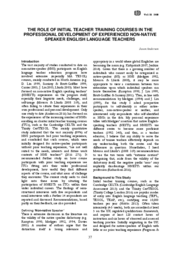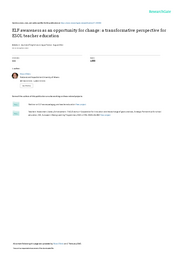Publications
Here you can find project-related publications.
- Coming soon! The paper "Preparing to Teach English in the Age of English as a Global Lingua Franca: Central European Perspectives" written by Dr. Ulla Fürstenberg and Prof. Judit Dombi is currently under review and will be published soon. Stay tuned!
- Teaching and learning Language Awareness - Jennifer Schumm Fauster & Ulla Fürstenbeg (Eds.)
Here you can find a list of publications which might be helpful to you as novice teachers:
Barrs, K. (2020). "Learning from the Linguistic Landscape: A Project-Based Learning Approach to Investigating English in Japan". Electronic Journal of Foreign Language Teaching 17(1): 7-15.
Berry, R. (2015). "Grammar myths". Language Awareness, 24(1), 15-37.
Erkurt, M. (2020). Generation Haram. Warum Schule lernen muss, allen eine Stimme zu geben. Vienna: Paul Zsolnay Verlag.
Huyer, M. (2019). "Linguistic Landscaping at School - A Teaching Design". GI_Forum 2: 206-212.
Norrington-Davies, D. (2018). From rules to reasons. Practical Ideas and Advice for Working with Grammar in the English Language Classroom. Pavilion.
Parrott, M. (2010). Grammar for English Language Teachers. With exercises and a key. 2nd ed. Cambridge: UP.
Roos, J., and Howard, Nicholas (2019). "Using young learners' language environments for EFL learning. Ways of working with linguistic landscapes". AILA Review 32: 91-111.
Scrivener, J. (2010). Teaching English Grammar. What to Teach and How to Teach it. London: Macmillan.
Shang, G., and Xie Fen (2020). "Is 'poor' English in linguistic landscape useful for EFL teaching and learning? Perspectives of EFL teachers in China". Int. J Appl Linguist 30(35): 35-49.
Soukup, B. (2020). "Survey are selection in Variationist Linguistic Landscape Study (VaLLS). A report from Vienna, Austria." Linguistic Landscape 6(1): 52-79.
Thornbury, S. (2015). "What do teachers need to know about language". ENGLISH TEACHING professional 100: 9-12.
Thornbury, S. (2017). About Language. Tasks for Teachers of English. 2nd ed. Cambridge: UP.
Yule, G. (2014). Explaining English Grammar. Oxford Handbooks for Language Teachers. Oxford: UP.
Here you can find interesting articles about the topic of "Language Awareness".
The Austrian Society for Language Didactics supports language didactic research and development, networks Austrian language didactics with international partners, develops scientifically based teaching and learning of foreign and second languages in schools, colleges, universities and other educational institutions, and helps to shape the institutional framework for language research, language teaching and language teacher training. It also promotes young academics and the transfer of theory and practice by organizing conferences for academics and practitioners.
The Association for Language Awareness aims at supporting and promoting activities across the whole breadth of Language Awareness. These are conducted in different fields of Language Awareness (e.g. mother tongue learning, foreign language learning, teacher education, language use in professional settings), at a variety of levels (e.g. primary, secondary and tertiary education, professional training and practice), and with objectives in a range of domains (e.g. effects on language performance, on attitudes to language etc).
The ALA pursues this goal in a variety of ways: for example, by collecting and disseminating information on Language Awareness initiatives, by promoting research into Language Awareness, by supporting initiatives undertaken by organisations with overlapping interests (e.g AILA), and by arranging conferences and meetings for practitioners and theorists in all spheres of teaching and learning, as well as for others with interests in Language Awareness.
For over 50 years, the International Association of Teachers of English as a Foreign Language, (IATEFL) has been linking, developing and supporting English language teaching professionals worldwide. From our humble origins in 1967 as a forum for English language teachers (ELT) and other professionals to make contact with one another and share ideas, we are now one of the largest and most internationally representative teaching associations in the world.
IATEFL is a global professional membership association, and a UK registered charity, and yet we remain a community. We support teachers and other ELT professionals in their professional development, and provide a platform where they can offer their views, exchange research and teaching experiences and learn from each other.
